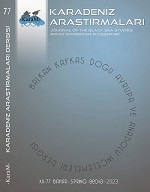RİZE’NİN ÜÇ ULEMASI VE MEZAR ANITI
THE THREE RELIGIOUS SCHOLARS OF RIZE AND THEIR GRAVE MONUMENTS
Author(s): Burak Muhammet GöklerSubject(s): Museology & Heritage Studies, Middle Ages, The Ottoman Empire, History of Islam
Published by: Karadeniz Araştırmaları Merkezi
Keywords: Rize; Tomb; Hasan Dede; Süleyman Dede; Süleyman Vehbi Efendi;
Summary/Abstract: Rize, which is a coastal city located on the borders of the Eastern Black Sea Region, is one of the cities that attract attention with its topographic structure, climate, vegetation, as well as historical and cultural heritage. It is thought that the history of the region, with limited information about prehistoric periods, goes back to the Lower Paleolithic period. Rize, which was home to several states and empires in the historical process, was conquered in 1461 and joined the Ottoman lands. The region, which grew and developed under the Ottoman rule, was first made part of the Batumi Sanjak and then the Trabzon Sanjak. With the conquest of Rize by the Ottomans, the Muslim people were settled in this geography and parallel construction activities started. During the period from 1461 to 1923, several structures were built in the region. In addition, educational activities were carried out to train people of the region. In this process, several scholars emerged in Rize as in other cities of Anatolia. After the death of these people, who directed and influenced the public in the region where they lived, their tombs were built by their relatives and the local people. Although the number of tombs in Rize is low, it is noteworthy that there are mausoleums belonging to the three people who are the subject of the research. Another detail is that the mausoleums are built in a plain and simple manner. The evaluation of these mausoleums belonging to Hasan Dede, Süleyman Dede and Süleyman Vehbi Efendi and the information about these historical figures form the basis of this paper.
Journal: Karadeniz Araştırmaları
- Issue Year: 2023
- Issue No: 77
- Page Range: 179-197
- Page Count: 19
- Language: Turkish

